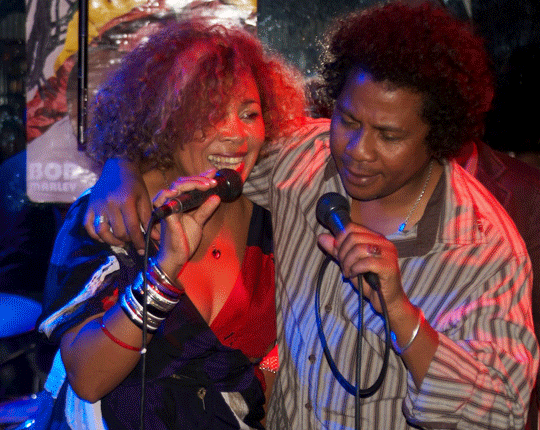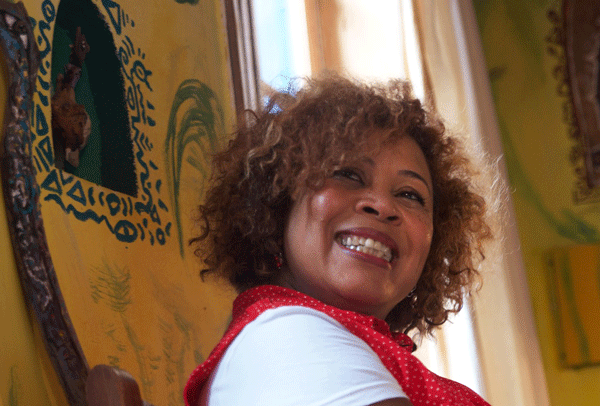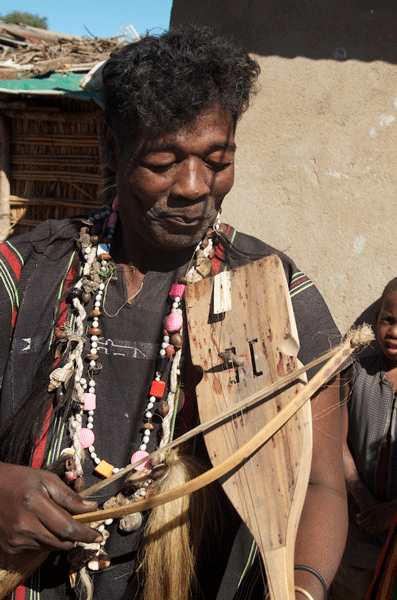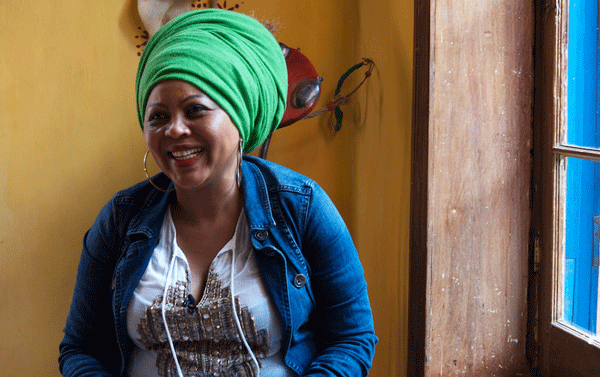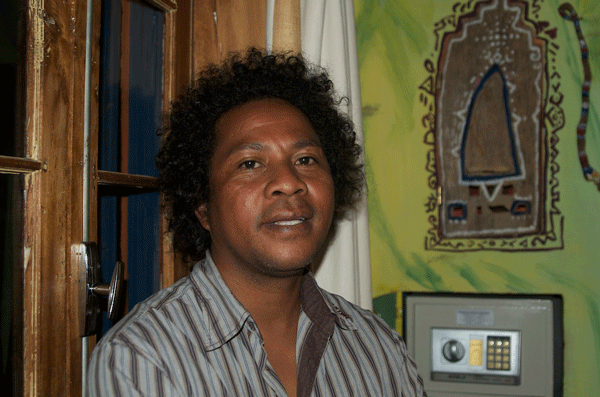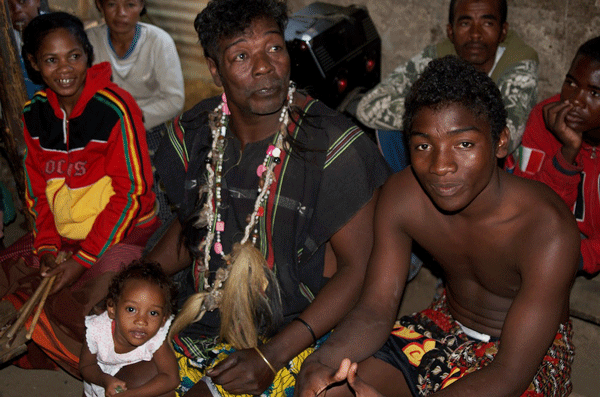The Afropop podcast “Beko ‘n’ Blues in Southwest Madagascar” showcases a little-known vocal music of southwest Madagascar, and its performance by three remarkable popular singers, Monika and Lala Njava and Mikea. Monika learned this art from the renowned Antandroy musician Remanindry, whose music is also featured in the podcast.
Monika Njava: "When I moved to Tulear, I started to also listen to Miriam Makeba. And afterwards, I was transported by the music of the Antandroy when they sang in the evening. They were the ones who guarded the houses, and they played instruments and sang beko. I was transported by this, and I decided to learn this kind of singing. This was how I came to learn with Remanindry. So I didn't go to music school; the time I spent with Remanindry was my university.
Reminindry with lokanga (Antandroy fiddle) Eyre 2014
"Beko [pronounced BEH-koo] is a style of the Antandroy. They sing it at funerals and ceremonies. There are groups of singers. The people who organize the funerals and ceremonies invite the groups to sing, and the beko singers, and they come and ask questions. 'Give us the history of this party. You are who?' The name of the family and everything. Then they start to improvise. Beko is based on improvisation, and they start to talk about all the things that surround the event, the history that they have received...
"Beko is a style with a lot of voices. There are some who improvise, and some who make the background. That's what's great about beko, no instruments and beko, only voices."
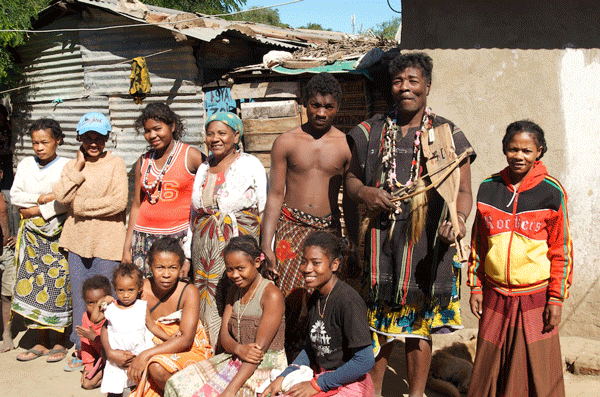 Remanindry with family and musicians (Eyre 2014)
Remanindry with family and musicians (Eyre 2014)
Remanindry: "Beko. This is for funerals. And when they sing, they hold their hands a certain way. Their gestures are different. This is just a custom. We don’t know the meaning of it.
"An Antandroy funeral could last for three months or five months, with singing and music. That’s the ceremony. We gather cows around the house. We have to sacrifice 30 cows to feed the guests. By gathering the cows around the place where the dead person is, it’s a way to publicize and to declare to the surrounding area that there is a dead person here—a beloved person, a member of the family.
"The cows are a custom, and we sacrifice them. It can be one or two, or 30. If the family is rich, they can hire artists like me. They call me to do the beko during the funeral. If not, they can’t. So they have to pay me in cows or something like that.
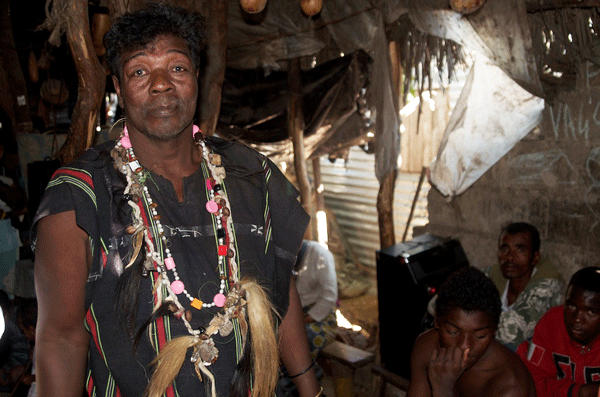 Remanindry in his home (Eyre 2014)
Remanindry in his home (Eyre 2014)
"Monika. Monika Njava. She came here, and I taught her. I taught her how to sing beko, the traditional way. You see these gourds on the ceiling? Our ancestors used them to take water, to keep water in. They would go outside and take the water from the well, and then keep it in the house, in the gourds. Because they didn’t have plates and bowls. They would cut the gourds, and use them to make furniture, including bowls and plates. That’s why we hang them from the ceiling, to remember the past, the way they lived."
Lala Njava: "We are all musicians in my family. The name of our father is Njava. He was a comedian of the street, and my mother was a gospel singer in church, so they were always in music. And we were numerous. I have 15 brothers and sisters, and we’re all musicians. So the five oldest brothers and sisters were the first-generation, and the second generation became the family group, Njava, and we made our careers in music in the 1990s. We won a contest organized by the Radio France International. We won the prize, and we went to Europe to make music.
"Beko is the blues for the ethnic groups of the southwest—that is, the towns we grew up in when we were young. Beko is for the Antandroy, the Sakalava and the Masikoro. These are the ethnic groups of the region. They share this style, beko. One can sing beko with instruments, with violin, with anything, but you have to guard the style. There's something you can't leave behind. If you go past that, it's no longer beko. One must sing with this thick voice. And it has to be very profound. It has to come from the heart. Sadness is the message.
"Beko talks about suffering. You sing it when you're making spiritual prayers. Because we, the Malagasy, we believe a lot in our ancestors, the life that comes after death. Everyone who is dead, family and friends who are gone, for us, they're not really dead. We discuss with them all the time, but by singing, especially with beko. You can't just sing beko any old way. That would lack respect. For these people, you must respect. You must sing beko in the right way.
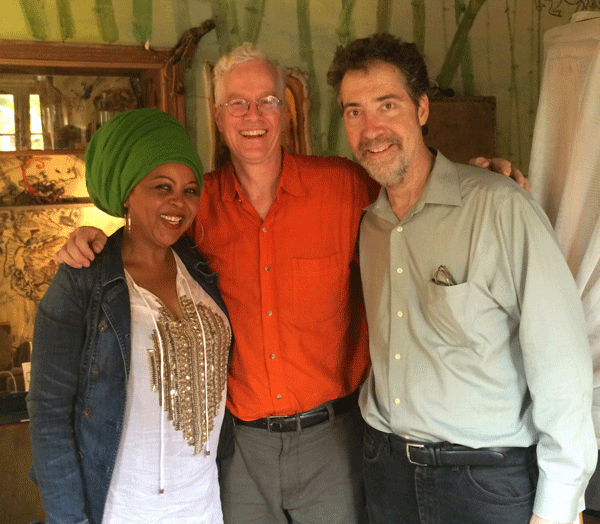 Lala Njava, Banning Eyre, Sean Barlow (Jonathan Longcore 2014)
Lala Njava, Banning Eyre, Sean Barlow (Jonathan Longcore 2014)
"For me, Christianity and ancestors go together. We are Malagasy. We don't have religious problems. Religion has never been a barrier. You can be Catholic. You can be Muslim. You can be Protestant, Buddhist… But the good luck that we have as Malagasy people is that we have our God together, and that is the ancestors. So everyone is free. Our power is the ancestors, the spirits. Afterwards, you can go to church and sing gospel, afterwards you can go to the mosque, wherever you like. It's not limited. Because we respect the God of Madagascar, the ancestors."
Mikea: "Mikea is a name of a Malagasy people who live in the forest in the southern Madagascar. These are people who made their lives in the forest. I come from southwestern Madagascar, north of Tulear. I gave the name Mikea to my group, because people don’t know it. It is cut off. There are no roads, no access, no schools or hospitals. I come from there, but I had the good luck to leave my region.
"There are different people in this region. The ones by the shore are the fishermen, the Vezo. After that, it's the forest, the Masikoro. The Masikoro are hunters and farmers and herders of cows. During the colonization of Madagascar, the Masikoro commanded a lot of respect. Many of the colonials were afraid to live in the villages in the forest at the time. So when we talk about Mikea, these are the Masikoro who live in the forest. They don't have passports. They don't have identity cards. We speak our own dialect. Mikea means 'call.' Because in the forest, if you want to see someone, if you want to find your family or friends, you have to cry out for them, using the echoes and the effects of the forest.
"I was a beko singer. Beko is the song of the cattle guardians. It's sung in the villages. We were not willing to do this in town, because we were ashamed. We couldn’t attract girls with our singing at that time, because we were ashamed of our dialect. And afterwards, when we started to work and make our fusion with blues, we gave a name to our music. It was not tsapiky. It was not salegy. We gave our music the name beko 'n' blues. It resembles the blues. It's the emotion of solitude, insecurity, many things, love. We mixed it with pop music, a little funk, to arrive at beko 'n' blues.
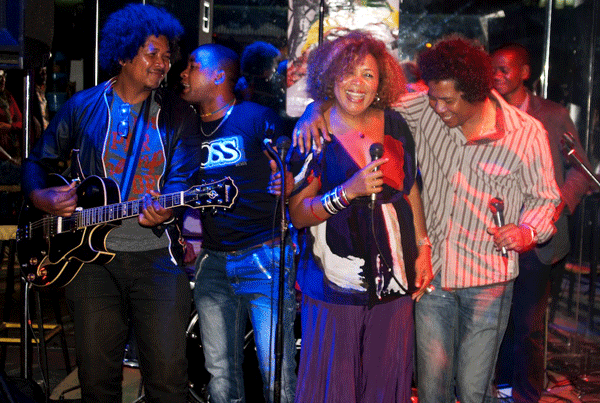 Monika, Mikea and others at Libertalia/Afropop showcase (Eyre 2014)
Monika, Mikea and others at Libertalia/Afropop showcase (Eyre 2014)
"It's rather hard to find people who sing beko among the Masikoro. It's complicated to sing. You have to have a voice, and you can't just sing in a straightforward way. You have to control your voice in a certain way, or they won't listen to you down there.
"The cattle thieves sing beko. This is something I know very well. I was a cattle guardian when I was young. From sunrise to sunset, you are with the cattle in the forest alone. And you sing. The guardians sing beko, and the cattle guardians are the ones who become the cattle thieves later. So it is also the song of the cattle thieves.
"Why are the cattle thieves? There are a lot of political stories here in Madagascar. In town, people live the modern way, with money in the bank. But in the village, there is no bank, so you buy cattle. When you need 100 euros, you sell a cow. The cattle are our bank. We keep cows to guard our wealth. I see you are a rich man because you have 400 head of cattle.
"There are cattle thieves because people didn't go to school. They are not educated. I have childhood friends who became cattle thieves. They've told me all about what happens there, and they asked me all about what happens here in Antananarivo and in Europe. So we tell each other everything and I understand that the problem is that they've never gone to school. When you are not educated, you are capable of killing someone and doing harm to your family. And even the country.
"So what do politicians do to deal with this problem? They send the military there to kill people. Maybe this is a short-term solution, but you have to think long term. Because cattle thieves have existed for 40 years. Some people think it is the culture to steal cows. No, this is not the culture. But when something stays the same for 30, 40 years, people start to think it's their culture. It's just like the pickpockets here in Antananarivo, this is not the culture of Madagascar. It's just lack of education. You have to build schools, send teachers, educate youth and their parents."








